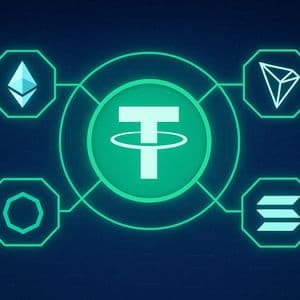When you hear traders talk about "USDT," they may or may not be referencing a single digital 0 in any case, behind the acronym is a sprawling, multi-chain ecosystem that spans across quite a few blockchain 1 the world’s largest stablecoin by market capitalization, Tether (USDT) has quietly become a universal medium of exchange by establishing its presence on over a dozen different blockchains, from the established infrastructure of Ethereum to the lightning-fast transactions on 2 guide cuts through the complexity to give you an actionable understanding of USDT's multi-chain 3 you're a DeFi enthusiast, a trader looking for low fees, or an investor exploring new networks, knowing where and how USDT operates is crucial for optimizing your crypto strategy and avoiding costly mistakes in this interconnected 4 Major Rails: A Comparison of Core USDT Networks The question every user aware of the ecosystem faces is, "Which USDT network should I choose?" The answer lies in understanding the distinct purposes of USDT on Ethereum, USDT on Tron, and USDT on 5 network implements the stablecoin through a different token standard—ERC-20 on Ethereum, TRC-20 on Tron, and SPL on Solana—creating unique trade-offs in transaction speed, gas fees, and 6 Ethereum USDT (ERC-20) is the gold standard for decentralized finance (DeFi).
Its compatibility with smart contracts makes it the preferred choice for complex DeFi strategies and institutional 7 transaction speeds can range from 15 seconds to 5 minutes, its gas fees fluctuate wildly, from $5 to over $50 during peak congestion. Ethereum's mature ecosystem and deep liquidity make it the top choice where security and functionality outweigh transaction 8 that, the TRC-20 USDT on Tron has become the dominant force for transaction 9 the TRC-20 standard, it delivers near-instant transfers (around 3 seconds) at minimal costs, typically under a 10 low-cost model explains why Tron processes more USDT transactions than any other network, making it perfect for payments and high-frequency trading where speed and affordability are paramount.
However, its DeFi ecosystem remains limited compared to Ethereum's extensive offerings. Finally, USDT on Solana (SPL) represents the new middle 11 implements Tether USD through the SPL standard, boasting sub-second transaction speeds and fees that average just a fraction of a 12 Solana's DeFi ecosystem is growing, its more recent USDT integration means it has less liquidity and fewer established protocols than Ethereum and Tron. Nevertheless, it's an attractive option for users seeking a modern, high-performance alternative to the core 13 & Emerging Fronts in The Broader Ecosystem Beyond the main three, USDT's expansion across next-generation blockchains offers a look into the future of decentralized 14 less-known networks provide specialized advantages that address specific market needs, from ultra-high throughput to mobile-first 15 on Aptos and Ton represent the new wave of high-performance blockchains designed for mainstream 16 uses its Move programming language for theoretical throughput of over 100,000 transactions per second, making it ideal for enterprise-grade 17 the other hand, USDT Ton's integration with Telegram’s massive global user base positions it as a gateway for crypto newcomers, enabling seamless social payments within the messaging app's 18 EVM-compatible landscape extends through USDT Avalanche and USDT Celo, each serving distinct market segments.
Avalanche's subnet architecture allows USDT to operate across custom blockchains while maintaining Ethereum compatibility, appealing to enterprises seeking scalable DeFi 19 takes a mobile-first approach, implementing USDT as a native asset optimized for smartphone-based financial services in emerging markets, where users can send stablecoins using a phone number. Interoperability-focused networks like Polkadot and Cosmos showcase advanced cross-chain 20 Polkadot, USDT operates via the Asset Hub parachain, enabling seamless transfers across the entire Polkadot 21 implements USDT through its Inter-Blockchain Communication protocol, allowing the stablecoin to move freely between connected zones, positioning it as a universal medium of 22 out the ecosystem are specialized networks: Liquid serves institutional traders with confidential transactions and faster settlement times, making it perfect for high-value USDT transfers requiring enhanced 23 on Tezos leverages the blockchain’s unique self-amending governance model, allowing the stablecoin functionality to evolve through on-chain voting.
Near-based USDT capitalizes on Near Protocol's sharding technology for low-cost, high-speed transactions, while USDT on Kaia (formerly Klaytn) focuses on mainstream adoption with its partnership-driven ecosystem, which is particularly strong in Asian 24 Critical Takeaway—How to Choose Your Network Choosing the wrong USDT network is the number one reason users lose funds. Thankfully, a simple three-question framework eliminates the guesswork and ensures successful transfers every 25 1: "What's my goal?" Fast payments or exchange deposits: Choose USDT TRC20 for low fees and 3-second 26 activities or smart contracts: Select USDT on Ethereum for maximum protocol compatibility, despite higher gas 27 institutional transfers: Consider USDT Liquid for enhanced privacy and professional-grade 28 DeFi or cost optimization: Explore the SLP USDT on Solana or other emerging networks for cutting-edge 29 2: "What does the receiving party support?" Always verify wallet compatibility before sending; most wallets display supported networks 30 exchange deposit pages for specific network requirements: many support multiple USDT 31 in doubt, ask first; a quick message can prevent irreversible fund 32 3: "What are the current fees?" Transaction fees fluctuate constantly, so always check real-time costs in your wallet or with a blockchain explorer before 33 fees spike during high activity, while Tron remains consistently 34 total costs; sometimes paying higher network fees saves you money on exchange withdrawal fees.
A Look Ahead: The Future of USDT Tether's strategic multi-chain expansion (and occasionally, contraction) shows a fundamental shift in how digital assets will operate in tomorrow's fragmented Web3 35 stablecoin regulation intensifies globally, Tether's diversified network presence positions it to maintain dominance regardless of which blockchain ecosystems emerge 36 company's proactive approach to emerging networks—from Telegram's Ton to Aptos's enterprise focus—demonstrates an understanding that the crypto trends of the next decade will favor interoperability over single-chain 37 article was prepared by Catherine 38 the lead writer in the ChangeHero team, she educates the user base about all things blockchain and crypto.
Disclaimer: This is a sponsored article and is for informational purposes 39 does not reflect the views of Crypto Daily, nor is it intended to be used as legal, tax, investment, or financial advice
Story Tags

Latest news and analysis from Crypto Daily



